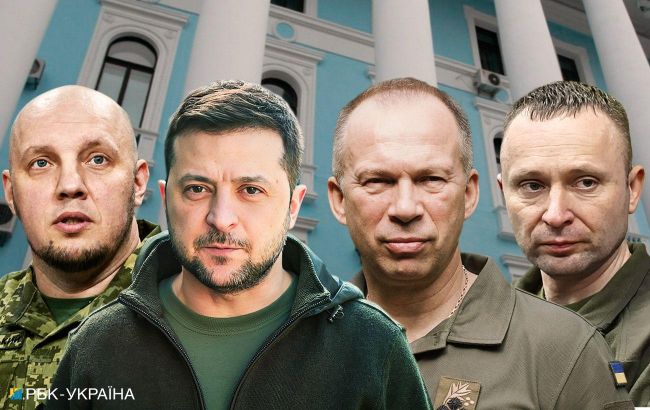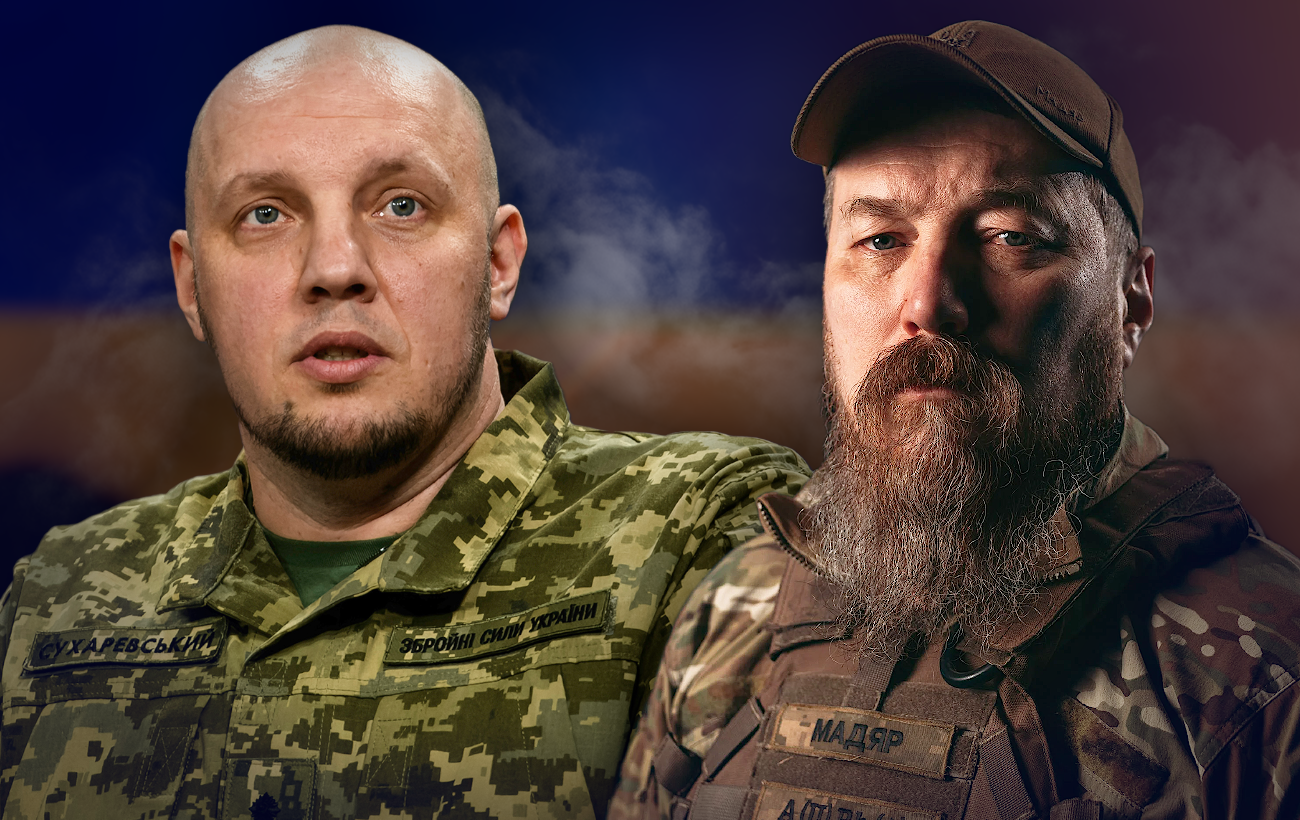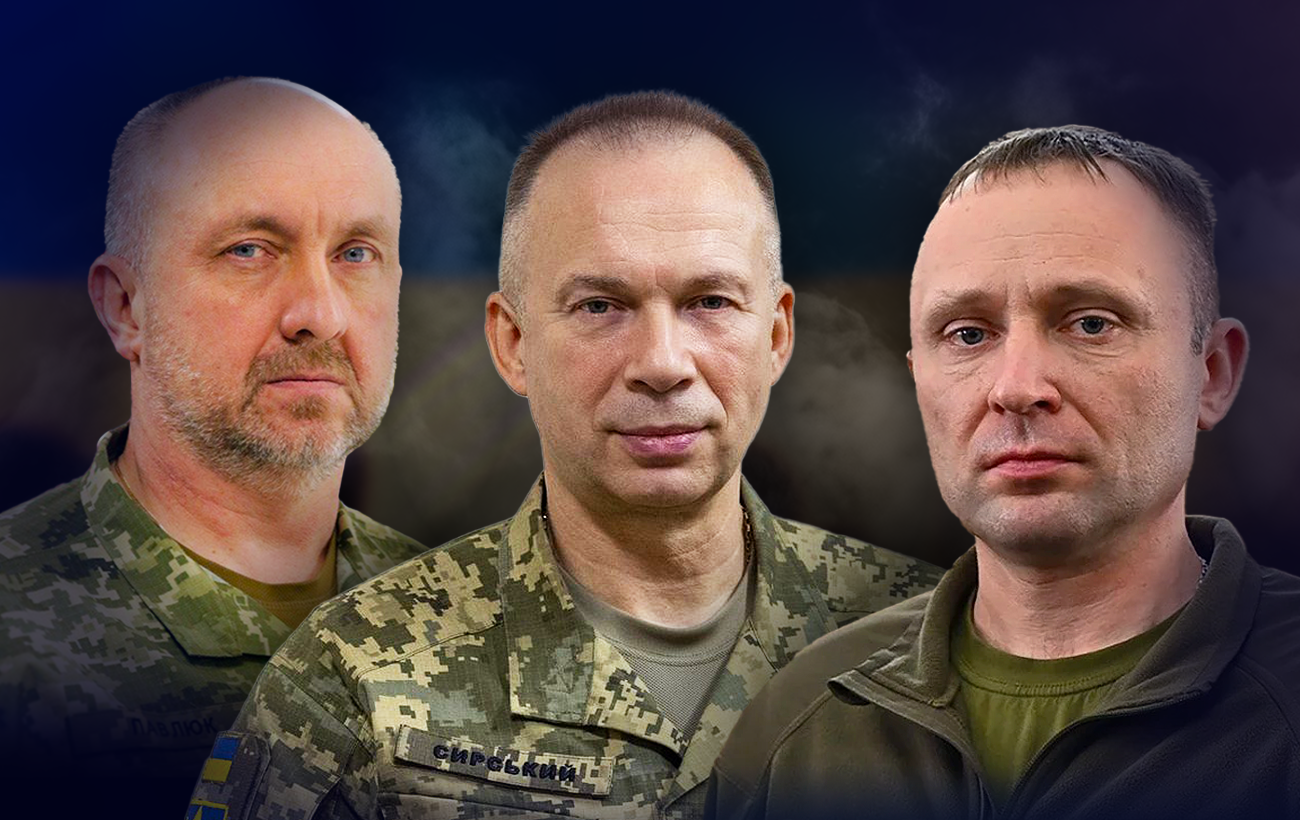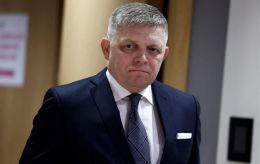Big changes in Ukraine's army: Why Zelenskyy is replacing top commanders
 Zelenskyy made changes in the leadership of the Ground Forces, the Airborne Assault Forces and the Unmanned Systems Forces (all collages: RBC-Ukraine)
Zelenskyy made changes in the leadership of the Ground Forces, the Airborne Assault Forces and the Unmanned Systems Forces (all collages: RBC-Ukraine)
President Volodymyr Zelenskyy has made a number of personnel changes in the leadership of the Armed Forces of Ukraine. RBC-Ukraine has found that the reasons behind these decisions go far deeper than just military expediency.
Key questions:
- Why the President dismissed Sukharevskyi and why not everyone was satisfied with him?
- What people are saying about the new Commander of the Unmanned Systems Forces?
- Why Drapatyi resigned and what issues he had in the Ground Forces?
- Why the Commander of the Airborne Assault Forces was replaced?
- How these changes may affect the military?
A new wave of reshuffles recently took place in the leadership of Ukraine's Armed Forces - in the Unmanned Systems Forces, the Ground Forces, and the Airborne Assault Forces. RBC-Ukraine spoke with over a dozen informed sources to uncover the reasons for these rotations. Their attitudes and perspectives differ. However, most agree that the reasons for these personnel changes lie not only in military necessity but also in personal ambitions and friction among the command staff.
Major General Mykhailo Drapatyi was dismissed from his position as Commander of the Ground Forces and transferred to the post of Commander of the Joint Forces. Instead of Colonel Vadym Sukharevskyi, Major Robert "Madyar" Brovdi was appointed Commander of the Unmanned Systems Forces. Sukharevskyi himself will now serve as Deputy Commander of the Operational Command East.
Major General Ihor Skybyuk was dismissed from his position as Commander of the Airborne Assault Forces and reappointed as Deputy Chief of the General Staff. Skybyuk was replaced by Brigadier General Oleh Apostol, who had previously been the Deputy Commander-in-Chief.
Unmanned Systems Forces: Sukharevskyi, Madyar, and Syrskyi
The decision to dismiss Vadym Sukharevskyi was not a complete surprise. Rumors about his potential replacement had been circulating for the past six months. In total, Sukharevskyi served as Commander of the newly created Unmanned Systems Forces for a year.
Sources close to him say that he found out about his dismissal on the very day the decision was publicly announced. As usual, Sukharevskyi traveled to Kyiv for work three times a week, and on the morning of June 3, he was once again headed to the capital.
"In the morning, he (Sukharevskyi - ed.) didn't know anything. By midday, he did. This wasn't the first attempt, but earlier he had managed to fend them off. This time, as you see, he was dismissed and even sent on a serious demotion," one source told RBC-Ukraine.
The main reason for Sukharevskyi's resignation, according to people in his circle, was the tension in his relations with the leadership of the Armed Forces, particularly with Commander-in-Chief Oleksandr Syrskyi. Sources close to the former commander of the Unmanned Systems Forces say that the General Staff considered him an "outsider" and didn't take him seriously. Sukharevskyi is 40, a colonel, and during the full-scale war, rose from being the commander of the 59th Motorized Infantry Brigade to leading an entire branch of the military. Hints of this information can also be found in his own statement after the decree was published.
 Vadym Sukharevskyi and Robert Brovdi (RBC-Ukraine collage)
Vadym Sukharevskyi and Robert Brovdi (RBC-Ukraine collage)
"The Unmanned Systems Forces Forces' portfolio includes innovative developments, unique and successful combat operations, and a new model of responsible recruiting. At this stage, however, our views on the future development of the Unmanned Systems Forces differ from those of the leadership. I believe that the honest and professional decision in this situation is to conclude my tenure as commander," Sukharevskyi wrote.
Sources in the General Staff, however, insist: there was no personal conflict between the Commander-in-Chief and Sukharevskyi - only dissatisfaction with his work. According to them, the first issues arose during the formation of the Unmanned Systems Forces' headquarters.
"Launching a new branch of the military means launching an entire system from scratch. The General Staff offered help - personnel for the headquarters - but they declined it. Syrskyi isn't a politician; he's a soldier. If Sukharevskyi is appointed, Syrskyi will work with him. But Sukharevskyi often didn't even show up to meetings with the Commander-in-Chief. Overall, we saw more PR than real work from him. Maybe the Paresident saw that too - after all, it was his final decision," said one RBC-Ukraine source.
At the end of July 2024, Captain Roman Hladkyi was appointed Chief of Staff of the Unmanned Systems Forces. Soon after, several media outlets reported that his wife allegedly lives in occupied Crimea and holds a Russian passport, and that their daughter had competed in sporting events for Russia. In addition, Ukrainian MP Mariana Bezuhla claimed that Hladkyi had previously been suspected of treason, espionage, and corruption.
The General Staff responded by stating that the new Chief of Staff had passed all necessary checks and had clearance to work with top-secret information. Eventually, after the scandal, the Commander-in-Chief ordered an additional special review of Hladkyi, who was temporarily suspended and later transferred out of the Unmanned Systems Forces.
"When it became clear things weren't going to work, they just appointed someone to the staff who was immediately 'sunk.' The main reason for Hladkyi's appointment was his experience in forming and operating headquarters," said a General Staff source.
At the same time, sources close to Sukharevskyi say none of their proposed candidates for the headquarters leadership were approved - they were all rejected. Another factor that irritated the General Staff was the suspicion that the Unmanned Systems Forces' Commander was lobbying for the purchase of drones from specific manufacturers involved in the Army of Drones project. Sukharevskyi denied this, insisting that the procurement requests came primarily from the end-users.
"Yes, the Unmanned Systems Forces had the ability to determine needs. But these needs were formed based on feedback from our units. If a drone from a particular manufacturer performed well, of course, it would be ordered again - it passed real combat tests. Also, it's a matter of market dynamics. If only a few top-quality FPV drone producers exist, most orders will inevitably go to them," one source explained.
In early 2025, a different project was launched, the Drone Line, aimed at using UAVs comprehensively to stop the enemy on the front line. Interestingly, the Unmanned Systems Forces were not involved in this initiative. According to the General Staff, the implementation of this idea was initially supposed to be handled by the Unmanned Systems Forces, but they showed little enthusiasm.
Eventually, the decision was made to launch the Drone Line under the umbrella of the Ground Forces. One of the faces of this project became the Commander of the 414th Strike Unmanned Systems Brigade of the Ground Forces - Robert "Madyar" Brovdi. He has now replaced Sukharevskyi. "Madyar" is not a career military officer - before the full-scale war, he worked in agribusiness. He began his military path with the Obolonskyi Territorial Defense unit.
"Sukharevskyi is a career officer who built a new branch under extremely difficult conditions. Now he's been appointed to what looks like a general's post, but in fact, it's a demotion - a deputy at an operational command after leading an entire branch. And 'Madyar' is like a 'military Trump' - a businessman who's good at organizing processes," said former Deputy Chief of the General Staff Ihor Romanenko.
Several other sources also pointed out that 'Madyar' has noticeably less military experience, although he is good at building communication and has strong organizational skills.
"Maybe Sukharevskyi didn't manage to prove himself as a leader. Whether Brovdi will succeed in his place is the question. But he's a fairly successful former businessman. After that, he managed to independently rise quickly in the army, becoming a brigade commander. His new position is about management too. I think his managerial skills will definitely help him in this role," said one of the sources.
Ground Forces and Unmanned Systems Forces
The dismissal of Ground Forces Commander Mykhailo Drapatyi occurred just days after a Russian attack on the 239th Training Center in the Dnipropetrovsk region. The ballistic missile strike killed 12 servicemen and injured more than 60 others.
This was the second attack on this center in the past six months. The previous one also resulted in numerous casualties. Following that accident, Mykhailo Drapatyi ordered an investigation and promised strict punishment if negligence was discovered. The enemy's attack on June 1 used the same tactic - a reconnaissance drone hovered in the sky to adjust the missile strike.
On that same day, Drapatyi submitted his resignation report, citing his "personal sense of responsibility for the tragedy at the 239th training ground." "Mutual cover-ups and impunity are poison to the army. I tried to eradicate them from the Ground Forces. But if the tragedies keep repeating - it means my efforts were not enough...," Drapatyi stated in his resignation letter, explaining his decision.
After a personal conversation with Commander-in-Chief Oleksandr Syrskyi, Chief of the General Staff Andrii Hnatov, and Drapatyi himself, President Volodymyr Zelenskyy transferred him to a new position - Commander of the Joint Forces. Effectively, the President accepted his resignation. Drapatyi himself said he remains "in the ranks," on the front line.
In the Ukrainian army, a general or officer cannot simply be dismissed - they must first be offered an equivalent or higher position corresponding to their rank. If no such position exists - only then can resignation occur.
The only equivalent vacant position at the time was that of the Joint Forces Commander. This role entails operational leadership of various branches of the military on a specific front during specific operations. However, since the legislation on the responsibilities of the Joint Forces Commander remains underdeveloped, the role of this structure still appears rather vague. Most likely, the Joint Forces Commander position will simply become Drapatyi's official post, from which he, as before, will be seconded to command the Khortytsia Operational-Strategic Group. Sources in military-political circles claim that this decision had also been maturing in the Presidential Office.
"He proved to be an effective combat general. But it gradually became clear that it would be difficult for him to lead both commands - the most difficult sector, Khortytsia - and also implement reforms in the Ground Forces, oversee territorial centres of recruitment, and improve the mobilization process. Drapatyi had no previous experience in non-combat posts, he's more about war. So it's actually good that he'll now be doing what he does best," one well-informed source told RBC-Ukraine.
 Oleksandr Pavliuk, Oleksandr Syrskyi, Mykhailo Drapatyi (collage by RBC-Ukraine)
Oleksandr Pavliuk, Oleksandr Syrskyi, Mykhailo Drapatyi (collage by RBC-Ukraine)
According to RBC-Ukraine sources, Drapatyi was originally considered for the position of Joint Forces Commander back in November 2024. But at the last moment, plans changed, and he was offered the Ground Forces Commander role instead, which was then held by General Oleksandr Pavliuk. Even though, according to insiders, there were no specific complaints against him, Pavliuk was offered another, not lower, position, which he declined.
Another factor that may have pushed Drapatyi toward resignation were disagreements with the Commander-in-Chief, several sources in military and political circles suggest. A source in the General Staff confirms that their relationship was far from smooth. Tensions began when Drapatyi was appointed to lead the Ground Forces.
"Not long after his appointment, Drapatyi said something like 'just wait, I'll be Commander-in-Chief soon' in front of colleagues. That message was passed on to Syrskyi. So how was he supposed to treat him after that? They had different views on how to conduct combat - when to hold positions or counterattack, and when to retreat. Drapatyi's resignation report was an open move into opposition to the Commander-in-Chief and looked like an attempt to shift the blame for the tragedies and territorial centres of recruitment stories. Maybe he was hoping the President would reject his report, giving him a kind of vote of confidence," one of the sources speculated.
On the other hand, Drapatyi's circle denies any backroom "games" on his part, insisting his actions were driven by the impossibility of fulfilling the objectives assigned to him.
"They say Drapatyi remains in the ranks and will work on the front. But he stepped down from the Ground Forces command, where respected generals are appointed so they can influence the work of territorial centres of recruitment and social support. And military personnel shouldn't be handling that at all. It turns out the Ground Forces Commander has to manage both the war and mobilization. Drapatyi clearly said 'I can't do this, you didn't give me the authority,' and filed a resignation report. Other generals were appointed to that role before him, and they ended up being scapegoats," says Romanenko.
Another point of contention between the Commander-in-Chief and General Drapatyi involved personnel issues. Those close to the former Ground Forces Commander claim that Syrskyi often blocked the dismissal of individuals Drapatyi believed needed to be removed. Some of them had been in the structure since Syrskyi led it. Although Drapatyi did manage to appoint some of his own people. Overall, personnel disagreements arose between them on everything from operational groups of troops to the gender adviser.
"Drapatyi is a relatively young general, talented. He was always sent to the most difficult situations. I don't believe he has political ambitions. But I'm sure his ambitions go beyond just being Ground Forces or Joint Forces Commander," said one officer who's neutral toward both sides.
As for the new Ground Forces Commander - several sources say the search for a candidate is still ongoing.
Another personnel decision by the President concerned the appointment of a new Airborne Assault Forces Commander. Brigadier General Oleh Apostol was appointed to the role. In November of last year, he, then the commander of the 95th Separate Airborne Assault Brigade, was appointed Deputy Commander-in-Chief of the Armed Forces. The previous Head of the Airborne Assault Forces, Ihor Skybiuk, was transferred to the position of Deputy Chief of the General Staff. All sources interviewed by RBC-Ukraine gave almost identical explanations for these personnel changes.
"Apostol comes from the Airborne Assault Forces; he was appointed to strengthen leadership in this branch particularly on the battlefield. Skybiuk is also a very capable general, but the decision was made that he would be better suited to work on troop training," explained one source.
Another RBC-Ukraine source in the Defense Forces explains that despite talk of some conflicts, all recent reshuffles are based on wartime realities.
"All the personnel changes will benefit the Armed Forces - except maybe Drapatyi's. He was really in the right place and is a very decent person. But if you say you're stepping down - then step down. At that level, once you declare your resignation, it's inappropriate to backtrack. 'Madyar' is experienced; we’ll see how he does. It's a whole system, and he needs to understand it thoroughly and lead it. Apostol is a combat commander, and I think that will help too," the source explains.
***
Since the start of the full-scale war, Ukraine's army has changed its Commander-in-Chief, replaced the Chief of the General Staff twice, and even more frequently reshuffled their deputies and branch commanders. The Ground Forces Command has changed heads twice, the Airborne Assault Forces twice, and the Joint Forces Command three times. And regardless of concerns that this could lead to disarray - history and war do not allow for hypotheticals.
Rotation of personnel in the Armed Forces is a normal process, which happens much more intensively than in civilian structures, says former Deputy Defense Minister Hanna Maliar, who worked in the Ministry of Defense for two years, right in the midst of the war. Usually, an officer’s term in a given position in the Armed Forces lasts up to five years, but during wartime, this can shrink to one or two years, Maliar told RBC-Ukraine.
"Replacing top military leaders during martial law is always a double risk. A person might not be able to handle the role, and that can significantly weaken the front. If a person climbs the career ladder step by step, the 'can they do it or not' question is more predictable," Maliar clarified.
However, in her opinion, to endure a full-scale war of this intensity, all processes must be accelerated, including finding nonstandard personnel solutions. There are already examples of mobilized civilians who proved themselves in combat and are capable of holding leadership roles, former Deputy Defense Minister noted.
"But they don't have the proper education or military rank. It's important to understand that in the military, each level of rank and position requires education that matches that level. As practice has shown - there are cases where taking a risk paid off, and others where people failed to handle larger and more complex tasks. That's when replacements are sought. This is a natural process that is risky, but also offers the Armed Forces a chance - to develop, to implement new ideas and practices," Maliar said.
Any career advancement and position changes within the army are definitely positive, agrees Ivan Tymochko, Head of the Reserve Council of the Ukrainian Ground Forces. In his opinion, this is the only way to exchange experience, knowledge, and best practices.
"In the army, what matters is your position, rank, and experience. Your last name matters less. Ukraine's army has dozens of generals and tens of thousands of officers. So there's always a need for some to advance and pass on their experience. That's why role rotation is important. In the military, you have to prove yourself at all levels - tactical, operational, operational-tactical, operational-strategic, and strategic," Tymochko told RBC-Ukraine.
The Airborne Assault Forces are one of the pillars of Ukraine's military strength, responsible for holding and stabilizing the front. The Unmanned Systems Forces - a unit with the potential to become a key pillar. The Ground Forces, the most numerous branch of the Armed Forces, bear perhaps the heaviest burden of the war. On top of that, under current conditions, they are also responsible for troop recruitment, managing territorial recruitment centers and carrying out mobilization.
Given the immense challenges they face, their current or future leaders cannot afford mistakes or second chances. So whatever the reason, motivation, or trigger behind the recent rotations - now, as the Russians throw everything into a final battle, the responsibility for top-level military personnel changes is higher than ever.

